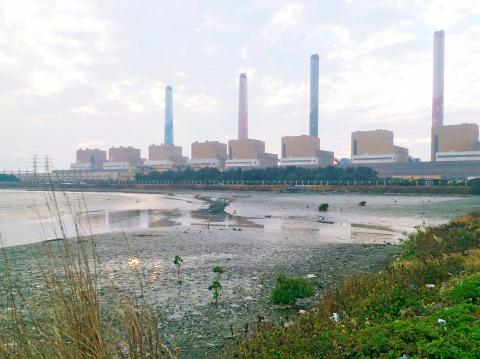Taiwan Power Co (Taipower) yesterday lowered output at the Taichung Power Plant in response to increased air pollution in central and southern Taiwan, while environmentalists said the company should shift to cleaner energy.
The power plant — the largest coal-fired plant in the world — reduced its power generation by about 5 percent from 11:50am to 6pm in an attempt to reduce its carbon emissions, Taipower said, adding that the plant was producing about 820,000 kilowatts (kW) less than its average 5.5 million kW per day, although one generator was also shut down for annual maintenance.
The output reduction was in accordance with an agreement the state-run company reached with the Taichung City Government. The agreement states that the plant should operate at a reduced capacity when concentrations of PM2.5 — fine particulate matter smaller than 2.5 micrometers — reach 71 micrograms per cubic meter at most of the city’s 11 monitoring stations, according to Taipower.

Photo: Huang Chung-shan, Taipei Times
The city government requested that Taipower lower output at the Taichung Power Plant yesterday morning when the index for PM2.5 hit “extremely high” levels. The index fell to a “medium” level in the afternoon.
Poor air quality is expected to persist in western parts of Taiwan and the outlying island of Kinmen until tomorrow, the Environmental Protection Administration said.
Taiwan Healthy Air Action Alliance convener Yeh Guang-peng (葉光芃) said that the company should cut power generation in winter and during holidays when electricity demand is low.
“Taipower should reduce output at its coal-fired plants when PM2.5 levels reach ‘medium’ levels or three days before predicted peak pollution days,” Yeh said, adding that more active measures should be in place to reduce air pollution when the PM2.5 index reaches excessive levels.
“The company should raise output of natural gas-powered plants and shift to cleaner energy, he said. “More than 70 percent of people are willing to pay higher electricity prices if that would be better for health and the environment [according to a poll by the Chinese-language Global Views Monthly last month]. Taipower should respond to the public’s expectation.”
Only 30 percent of the nation’s gas-powered plants are active in winter, and pollution would be sufficiently reduced if all those plants could run at full capacity all year round, he added.

The High Prosecutors’ Office yesterday withdrew an appeal against the acquittal of a former bank manager 22 years after his death, marking Taiwan’s first instance of prosecutors rendering posthumous justice to a wrongfully convicted defendant. Chu Ching-en (諸慶恩) — formerly a manager at the Taipei branch of BNP Paribas — was in 1999 accused by Weng Mao-chung (翁茂鍾), then-president of Chia Her Industrial Co, of forging a request for a fixed deposit of US$10 million by I-Hwa Industrial Co, a subsidiary of Chia Her, which was used as collateral. Chu was ruled not guilty in the first trial, but was found guilty

DEADLOCK: As the commission is unable to forum a quorum to review license renewal applications, the channel operators are not at fault and can air past their license date The National Communications Commission (NCC) yesterday said that the Public Television Service (PTS) and 36 other television and radio broadcasters could continue airing, despite the commission’s inability to meet a quorum to review their license renewal applications. The licenses of PTS and the other channels are set to expire between this month and June. The National Communications Commission Organization Act (國家通訊傳播委員會組織法) stipulates that the commission must meet the mandated quorum of four to hold a valid meeting. The seven-member commission currently has only three commissioners. “We have informed the channel operators of the progress we have made in reviewing their license renewal applications, and

Taiwan People’s Party (TPP) Chairman Huang Kuo-chang (黃國昌) yesterday appealed to the authorities to release former Taipei mayor Ko Wen-je (柯文哲) from pretrial detention amid conflicting reports about his health. The TPP at a news conference on Thursday said that Ko should be released to a hospital for treatment, adding that he has blood in his urine and had spells of pain and nausea followed by vomiting over the past three months. Hsieh Yen-yau (謝炎堯), a retired professor of internal medicine and Ko’s former teacher, said that Ko’s symptoms aligned with gallstones, kidney inflammation and potentially dangerous heart conditions. Ko, charged with

Taiwan-based publisher Li Yanhe (李延賀) has been sentenced to three years in prison, fined 50,000 yuan (US$6,890) in personal assets and deprived political rights for one year for “inciting secession” in China, China's Taiwan Affairs Office spokesman Chen Binhua (陳斌華) said today. The Shanghai First Intermediate People’s Court announced the verdict on Feb. 17, Chen said. The trial was conducted lawfully, and in an open and fair manner, he said, adding that the verdict has since come into legal effect. The defendant reportedly admitted guilt and would appeal within the statutory appeal period, he said, adding that the defendant and his family have